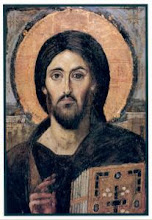Monday, January 27, 2014
God and Sacramental Theology
“The word sacrament in Greek means “mystery.” A sacrament is
an outward and visible sign instituted by God in order to convey inward and
spiritual grace. Thus the sacraments have become a main stay of the Church. It
is important to note that God’s grace is expressed through these religious
rights known as sacraments.” [Donald McKim, Westminster Dictionary of
Theological Terms pg. 245]
God wants to communicate and be in touch with human
beings. Creation is an overflow of God’s
divine love, and since God created humanity to partner with God in taking care
of creation, God seeks an intimate association with us. We experience this
interaction between God and ourselves through the actions of prayer and
meditation. Human acceptance of God takes place by faith, not evidence. This
process is called Revelation, meaning God
speaking to us. God’s revelation takes place not only within individuals,
but corporately as well. We have the capacity to see God working in the lives
of others, thus we experience revelation. When people exchange their experiences
of God through their conviction, communities of faith arise; in our case the
Church.
When God allows God’s self to touch the lives of humanity
God is fully present. God excludes no one from the divine love expressed within
the “God Head” or Trinity. This is often revealed in the sacraments. God holds
no one apart from God’s love. God’s love is concrete and embedded in the mostly
resistant nature of humanity. God seeks to radically change our lives by
reconciling God’s self to us. Like it or not we humans are dependent on God’s
revelation. How then does God get through to our often-hardened hearts? The
answer is by becoming vulnerable to us and our understandings. Thus
vulnerability is important for humanity in our relationship with God. We cannot
give or accept love unless we are willing to become vulnerable. God sets the
example.
God’s presence is often communicated to humanity through the
sacramental acts of the church. God approaches people in life, often seeking to
change them in a positive manner. Yet God is present in the sacraments of the
church without destroying our uniqueness. Through the sacramental structure God
seeks to shape our lives whether we are aware of it or not.
The language of the sacraments is often seen in symbols.
These symbols are signs or indicators of God’s holy presence in our
participation. A symbol is effective in our lives because it leads us into the
reality of God’s presence. The sacraments cause humanity to exercise the spirit
within. Thus we discover that God decisively shapes human reality from the
beginning of our lives to the end. Through the sacraments we experience God’s
grace and become aware of the intimate nearness of God; it is at this point
that revelation occurs.
In order to fully understand the sacraments we must first
believe that Jesus is God’s self-communication to humanity. Christology is
essential in understanding sacramental theology. Jesus is the authentic
revealer of God’s will, drawing humanity ever deeper into a relationship with
God. In Christ we recognize the how the most intimate nearness to God does not
disrupt our uniqueness, but rather liberates it to be ourselves.
Through the sacraments of baptism, confirmation, Eucharist,
reconciliation and unction we grow closer in our relationship to God through
the love of Christ, who is present in all the sacraments. God restores our
hope, heals our wounds and reconciles us to God through the sacramental acts
founded on the love and sacrifice of Jesus Christ.
Much of the information contained in this article is
credited to the book “Sacramental Theology” by Herbert Vorgrimler, as well as “Westminster
Dictionary of Theological Terms” by Donald K. McKim.
Subscribe to:
Post Comments (Atom)
Trinity Wall Street Conference Center Chapel

Our prayers rise like incense into heaven
Church of the Good Shepherd, Augusta, Ga.

"...And the sun shall not strike you by day, nor the moon by night."

























No comments:
Post a Comment